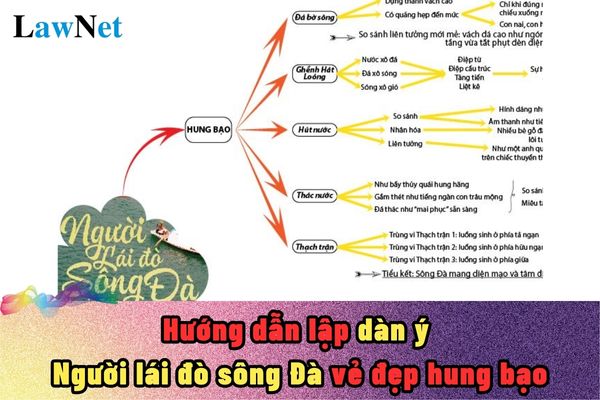Vietnam: What are the guidelines for preparing the outline of an essay on "The Ferryman of the Da River/Người lái đò sông Đà" and its savage beauty? What is the literary genre of this work in the Literature curriculum?
What are the guidelines for preparing the outline of an essay on "The Ferryman of the Da River/Người lái đò sông Đà" and its savage beauty?
Students can refer to the following What are the guidelines for preparing the outline of an essay on "The Ferryman of the Da River/Người lái đò sông Đà" and its savage beauty:
|
What are the guidelines for preparing the outline of an essay on "The Ferryman of the Da River/Người lái đò sông Đà" and its savage beauty Introduction: |
Note: The information on the guidelines for preparing the outline of an essay on "The Ferryman of the Da River/Người lái đò sông Đà" and its savage beauty is for reference only./.

What are the guidelines for preparing the outline of an essay on "The Ferryman of the Da River/Người lái đò sông Đà" and its savage beauty? What is the literary genre of this work in the Literature curriculum? (Image from the Internet)
What is the literary genre of "The Ferryman of the Da River/Người lái đò sông Đà" in the Literature curriculum?
According to Section 9 in the General Education Program for Literature issued with Circular 32/2018/TT-BGDDT, the 12th-grade Literature curriculum includes:
...
Memoirs
- Who Named the River? (Hoang Phu Ngoc Tuong)
- Com Te Mieng (Vu Trong Phung)
- Walking on Hanoi Streets (Do Chu)
- The Ferryman of the Da River/Người lái đò sông Đà (Nguyen Tuan)
- The Diary of Dang Thuy Tram (Dang Thuy Tram)
- The Most Difficult Decision (Excerpt from Dien Bien Phu - Rendezvous with History - Vo Nguyen Giap)
- Living to Tell the Tale (G. Marquez)
- Oh Spirits, We Have the Village Elders (Trung Trung Dinh)
- The Procedures for Being Alive (Minh Chuyen)
- The Journey to the Capital (Hai Thuong Lan Ong)
- In the Storms of Truong Sa (various authors)
- Village Affairs (Ngo Tat To)
- ...
Thus, according to the regulations, "The Ferryman of the Da River/Người lái đò sông Đà" is classified as a memoir in the Literature curriculum at the upper secondary level.
What literary knowledge do students in Vietnam study in the 12th-grade Literature curriculum?
According to subsection 2 of Section 5 in the General Education Program for Literature released with Circular 32/2018/TT-BGDDT, 12th-grade students study the following literary knowledge:
*VIETNAMESE LANGUAGE KNOWLEDGE
- Preservation and development of the Vietnamese language
- Logical errors, ambiguous sentences, and how to correct them
- Rhetorical measures of sarcasm, paradox: characteristics and effects
- Types of texts and genres
+ Argumentative text: the role of arguments, reasoning, and evidence; the author's purpose, emotion, and standpoint; measures to increase affirmation and negation in argumentative texts;
Method of argumentation and emotive language; speeches at the launch of a movement or social activity; essays on issues relevant to young people; essays comparing and evaluating two literary works either within the same or different genres
+ Informative text: the value of topics, main information in the text; data types and data reliability; work exchange letters; project assignment reports or research results on a natural or social issue
- Respect and protection of intellectual property rights in study and research
- Basic features of formal and intimate language: understanding and application
- Non-verbal communication tools: images, figures, charts, diagrams,...
*LITERATURE KNOWLEDGE
- The cognitive, educational, and aesthetic functions of literature
- Appropriateness of themes, ideas, and predominant emotions
- Some expressions of artistic style in folk literature, medieval literature, modern literature, realistic and romantic tendencies; the author's artistic style
- Some elements of legendary tales, novels (modern and postmodern), modern lyrical poetry, comedy, memoirs
+ Legendary tales: topics, characters, language, artistic methods; evaluating the role of magical elements in legendary tales and relating them to their roles in folk tales
+ Novels (modern and postmodern): language, psychological developments, and character actions
+ Modern lyrical poetry: language, images, symbols, symbolic and surreal elements
+ Comedy: language, characters, situations, satirical techniques
+ Reports, diaries, or memoirs: non-fictional nature, description, narration; combination of detail, realism with the writer's experiences, attitudes, and evaluations
- Psychological developments of characters and methods of expressing character psychology by the author
- The relationship of the narrator's perspective in expressing the theme of the text
- Basic understanding of Ho Chi Minh aiding in comprehending some major works by this author
- A brief overview of literary history and the role of foundational literary history knowledge in reading and understanding texts.

